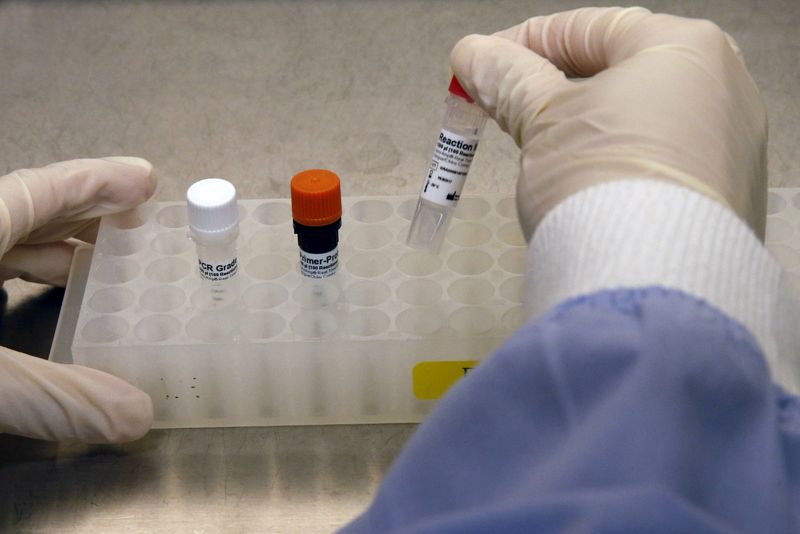By Stephanie Nebehay and Kate Kelland
GENEVA/LONDON (Reuters) - The World Health Organisation advised women on Wednesday on how to protect themselves from Zika, particularly if pregnant, but also reassured them that most women in areas affected by the mosquito-borne virus will give birth to "normal infants."
The illness, until recently viewed as relatively mild, has sparked concern because of a possible link between infection in pregnancy and microcephaly, a rare birth defect in which infants are born with abnormally small heads that can be accompanied by developmental problems.
Brazil, the worst hit country in an outbreak sweeping the Americas and now present in more than 30 countries, is investigating a potential link between Zika infections and more than 4,000 suspected cases of microcephaly. Researchers have identified evidence of Zika infection in 17 of these cases, either in the baby or in the mother, but have not confirmed that the virus can cause microcephaly.
In its advice, the Geneva-based WHO said women in areas with the virus should protect themselves, especially during pregnancy, by covering up against mosquitoes and practicing safe sex through the use of condoms. It said more evidence was needed to confirm whether sex commonly transmits the virus.
The agency, which declared a health emergency over Zika on Feb. 1, did not recommend travel restrictions but suggested women should consult their doctors or authorities if travelling.
Pregnant women in general, including those who develop symptoms of Zika infection, should see their health care provider for close monitoring. But the WHO was also reassuring, declaring: "Most women in Zika-affected areas will give birth to normal infants."
A study published Wednesday in the New England Journal of Medicine provided new evidence strengthening the association between Zika virus and a spike in birth defects, citing the presence of the virus in the brain of an aborted foetus of a European woman who became pregnant while living in Brazil.
Professor Tatjana Avšič Županc, who led the researchers in the study, said in an email her team's findings "may present the most compelling evidence to date" of the link between Zika and birth defects.
As scientists race to find out more about the virus and its possible effects, 30 of the world's leading scientific research institutions, journals and funders pledged to share for free all data and expertise on the virus as soon as they have it.
"The arguments for sharing data and the consequences of not doing so (have been) ... thrown into stark relief by the Ebola and Zika outbreaks," said the agreement by an unprecedented number of signatories in the Americas, Japan, Europe and elsewhere. There is as yet no vaccine or treatment for the disease.
Specialists welcomed the initiative, saying it showed how the global health community had learnt crucial lessons from West Africa's Ebola epidemic, which killed more than 11,300 people.
Mark Woolhouse, a University of Edinburgh professor of infectious diseases, said the commitment "if acted upon...will save lives."
ABORTION AND THE CHURCH
The Zika outbreak has raised the issue of a woman's reproductive rights including abortion, a contentious issue in much of Latin America. The WHO said on Wednesday that, "Women who wish to terminate a pregnancy due to a fear of microcephaly should have access to safe abortion services to the full extent of the law."
Abortion is illegal in many cases in Brazil, and in much of the region. Reflecting the influence of the Roman Catholic Church in many parts of the Americas, a Catholic group appealed to Pope Francis on Wednesday to allow Church members to "follow their conscience" and use contraception or to let women have abortions to protect themselves against Zika.
Catholics for Choice, a liberal advocacy group based in Washington, said in a statement it would run ads in the International New York Times and El Diario de Hoy in El Salvador on Thursday, the eve of a papal trip to Cuba and Mexico.
"When you travel tomorrow (Friday) to Latin America, we ask you to make it clear to your brother bishops that good Catholics can follow their conscience and use birth control to protect themselves and their partners," the ad will say, according to advance excerpts released in the statement.
The Catholic Church teaches that life begins at the moment of conception and that abortion is killing. It also bans artificial birth control such as condoms, arguing that they block the possible transmission of life. The ban is widely disregarded in many countries, but activists say there is still a stigma attached to birth control in some Latin American countries because of the edict.
In its statement on Wednesday, the WHO said microcephaly cannot reliably be predicted by early ultrasounds, "except in extreme cases." This point is important, as even in countries where abortion services are freely available, they are generally prohibited after a certain point in the pregnancy.
The head of the U.S. Centers for Disease Control and Prevention on Wednesday told a Congressional hearing that he expects Puerto Rico, a U.S. territory in the Caribbean, to be hard hit by Zika. Mosquitoes have already passed the virus to people in Puerto Rico and the U.S. Virgin Islands.
"We will likely see significant numbers of cases in Puerto Rico and other U.S. territories," CDC Director Dr. Tom Frieden told the House Foreign Affairs subcommittee hearing.

So far there have been no cases of Zika passed by mosquitoes in the continental United States, said U.S. Health and Human Services Secretary Sylvia Burwell on Wednesday.